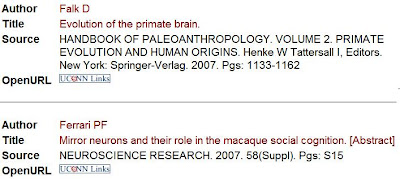provides bibliographic access to the scientific literature on nonhuman primates for the research and educational communities. Coverage of the database spans 1940 to present and includes all publication categories (articles, books, abstracts, technical reports, dissertations, book chapters, etc.) and many subject areas (behavior, colony management, ecology, reproduction, field studies, disease models, veterinary science, psychology, physiology, pharmacology, evolution, taxonomy, developmental and molecular biology, genetics and zoogeography).I did a search for mirror neurons, and found over 200 results -- plus a subject heading for mirror neurons. The metadata is impressive: you can search or browse by taxonomy (macaca), diseases (depression) anatomy (frontal cortex), behavior (theory of mind), disciplines (experimental psychology), and much more!
A cool feature of PrimateLit is that it
... attempts to identify each user's institutional affiliation and automatically provide links to that institution's online journals and other content from within search results. If PrimateLit can't automatically identify the proper institution, the user is prompted to manually set the preference through a simple form.For librarians, this means that it takes advantage of OpenURL technology, and if you've registered your OpenURL resolver with WorldCat.org, it will automatically display your OpenURL resolver of choice. For researchers, if your library has done this behind-the-scenes magic, it means that if your library has the full-text of an article cited in PrimateLit, you will be able to get to it easily. Click on the "Institutional Affiliation" button on the search page to see if your institution is participating.
Here's what it looks like at UConn:

Where clicking on "UCONN Links" will ultimately lead you to the full-text of the article, if UConn has it online.
Quite impressive!
No comments:
Post a Comment